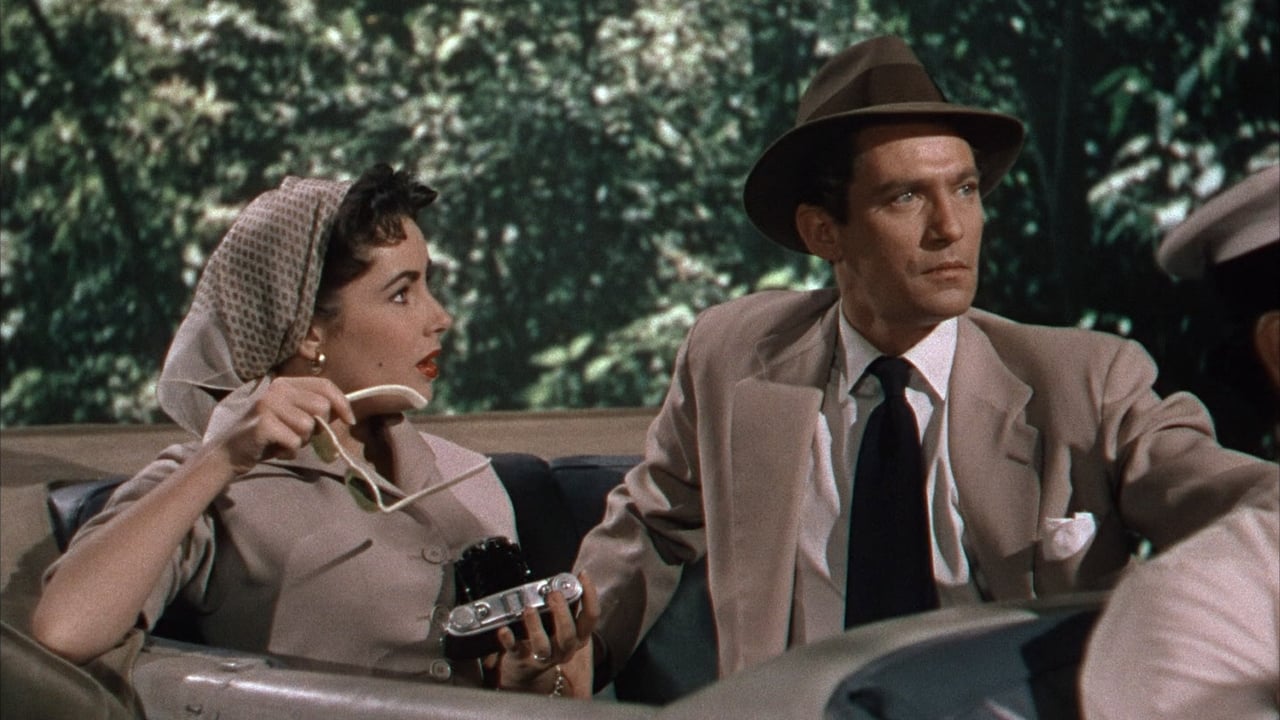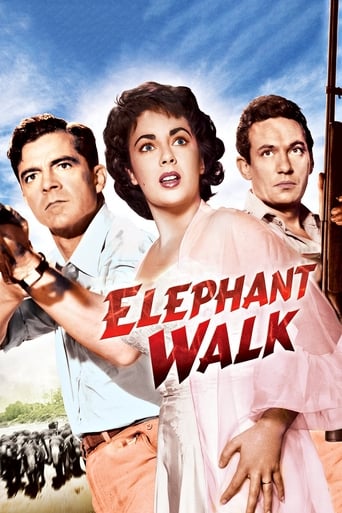



Really Surprised!
A Disappointing Continuation
There is just so much movie here. For some it may be too much. But in the same secretly sarcastic way most telemarketers say the phrase, the title of this one is particularly apt.
View MoreClever and entertaining enough to recommend even to members of the 1%
View MoreElizabeth Taylor's role in Elephant Walk reminds me of her role in Giant. She's married to a very powerful man, but she can't seem to quell her rambunctious nature, often starting fights and dishing out what she takes. So, if you liked Giant, try this one, and vice versa.In Elephant Walk, Liz is wooed and wed by the wealthy Peter Finch, but when he takes her into his world (much like in Giant), she doesn't quite fit in. She moves to the tropical tea plantation in Ceylon, but the cultural and lifestyle changes are difficult. And when hunky Dana Andrews enters the picture, she just might find a distraction from her new surroundings. . .With Liz and Dana, there's lots of eye candy in this movie. A few strong-willed speeches and some romantic scenes don't make it the most memorable film to come out of the 50s, but it's worth it if you like good-looking people up on the screen.
View MoreA beautiful shopgirl in London is swept off her feet by a millionaire tea plantation owner and soon finds herself married and living with him at his villa in British Ceylon. Although based upon the book by Robert Standish, this initial set-up is highly reminiscent of Hitchock's "Rebecca", with leading lady Elizabeth Taylor clashing with the imposing chief of staff at the mansion and (almost immediately) her own husband, who is still under the thumb of his deceased-but-dominant father. Taylor, a last-minute substitute for an ailing Vivien Leigh, looks creamy-smooth in her high fashion wardrobe, and her performance is quite strong; however, once husband Peter Finch starts drinking heavily and barking orders at her, one might think her dedication to him rather masochistic (this feeling hampers the ending as well). Still, the film offers a heady lot for soap buffs: romantic drama, a bit of travelogue, interpretive dance, an elephant stampede, and a perfectly-timed outbreak of cholera! *** from ****
View MoreElizabeth Taylor, fresh from Chillingford-on-the-Thames, has just married Ceylonese tea planter Peter Finch and he's taken her back home. He's got quite a place over in what is now Sri Lanka, a 'bungalow' big enough to have a polo field. And that's exactly what they do there. He and his father's friends get on bicycles and play polo in the living room.It's all tradition you know started by Finch's dad who is known to one and all as 'the Guv'nor.' He must have been something else, in everyone's memory he becomes almost a caricature of the colonial Briton.The man must truly have been nuts or else he was one of those colonials who Noel Coward warned went out in the noon day sun a little too long. He built this palatial estate right on a well worn path that the elephants use to get to fresh water when the streams dry up in their neck of the woods. The local natives have to periodically ward them off with noise. They can't kill them because of the strict conservation laws and the Buddhist tradition. Maybe I missed something here, but did he have to build the house right there? Does make for a spectacular climax though.Peter Finch feels the need to keep traditions up and all the friends come over every week, get stinking drunk, and play bicycle polo in the living room. Not exactly the home Liz had in mind. She seeks some solace with overseer Dana Andrews who being American is not into all the colonial British traditions.Elephant Walk, which is also the name of the Finch estate, has the advantage of some really beautiful cinematography in Sri Lanka. Lends an air of realism to a rather unreal plot. Check out Abraham Sofaer who plays the major domo of Elephant Walk with the biggest handlebar mustache on record. One that Terry-Thomas would have envied.Vivien Leigh was supposed to do Elephant Walk, but she bowed out do to health issues. That tuberculosis did flare up at the right time though.
View MoreELEPHANT WALK may not be the acme of literature or of film, but it is great entertainment in the quasi-melodramatic mode. It is the story of love, both genuine and illicit, as well as overweening ambition, devotion, and the arrogance of personal tyranny. A previous reviewer, John Mankin, questions why the central focus of the film, the mansion called Elephant Walk, should have been built by the former owner, the "governor" the late Tom Wiley, right across the elephants' traditional path to the major source of water, the river. To miss this point is to essentially miss the point of the whole center of the film: the hubris of man. That his son, played by Peter Finch, should become enthralled by the super image and enigma of his revered father, is not unexpected, since the son was without a mother growing up in a foreign jungle with only his father and his father's rowdy 'boys' club' as his role models. The point of the father was that he was a self-made man who would tame nature to his liking, and that liking was not just a tea plantation upon the lands the elephants once dominated, but also that he would dominate even the large bull elephant that led the herd, and thus he would dominate his son and all around him, and so we join the tale after the elephants have been denied the crucial dry season access to their pathway to water. Who could know that this dry season would last so long and what the elephants would do in desperation to get water? This is the nexus of the film: what will animals do to get water; what will humans do to get power or love? Ceylon, today's Sri Lanka, is the huge island off the coast of India where the plantation is located and one quickly learns that it is the real scenery of the story, not just the expenses of Miss Taylor. Were it not for this exotic location (much of the film was shot in Ceylon), and the magnificent "bungalow" this would have been just another potboiler. One must recognize the atmosphere created here as integral to the time and place, as it illuminates the latter day wealth and power attained by the English immigrant 'conquerors' that were part and parcel of the British raj. It is only such wealth gained by the use of virtual slave labor that one could build so magnificent a residence of ebony, teak, and marble. Not to be overlooked are the wonderfully carved Jalees (grille work window and doorway borders) evidently specified by art directors J. McMillan Johnson and Hal Pereira and obviously made by the cheaper labor on the island. Such craftsmanship reveals the careful attention to detail that these men sought.For those immune to the blandishments of time, place, and architecture, there is always the allure of Miss Taylor, as she marries a man she doesn't really know and is tacitly wooed by a another man, against the background described, and under the overarching tyranny of the legacy of a man deceased. As I said, it is not great literature nor even great film, but it is great spectacle long before that term was debased by the special effects extravaganzas of today.This is one of those films made to be seen on the giant screen of an outdoor drive-in, not on the home TV, so arrange the largest screen to see it on to fully appreciate its fine camera-work and scope.
View More